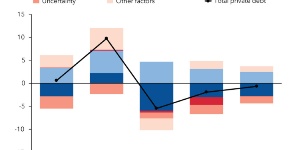Business News of Tuesday, 3 December 2024
Source: www.ghanawebbers.com
Persistent fall in private borrowing brings global debt down
The IMF’s latest Global Debt Database reveals a modest decrease in global debt to 237% of GDP in 2023.
Private debt declined by 2.8 percentage points to 143% of GDP, driven primarily by weak growth prospects, as businesses and households reduced borrowing amidst economic uncertainty.
The contribution of surprise inflation to debt erosion, a key factor in 2021–2022, also diminished.
However, public debt continued to rise, posing significant fiscal risks. The IMF’s Fiscal Monitor highlights the need for structural reforms to ensure sustainable growth, including innovation-focused public investment and improved debt management.
While private debt fell, global non-financial corporate and household debt remains elevated at over $150 trillion, underscoring the challenges of managing high debt alongside weak growth, and the importance of policies fostering resilience and long-term economic stability.











